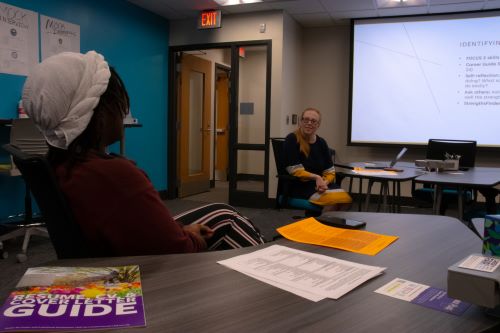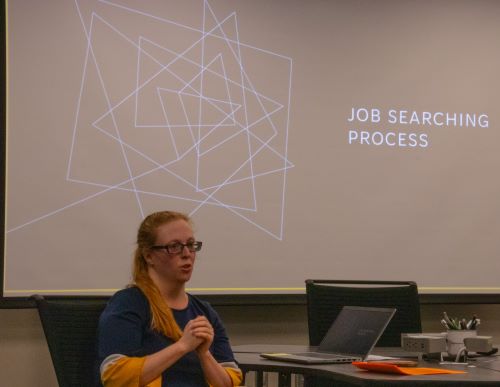No two people share the same thoughts or brain; we are unique individuals with strengths and weaknesses. Neurodiversity refers to the growing body of people with unique mental cognition, such as those with autism, ADHD, OCD, etc.
Carrie Hachadurian, Associate Director for Career-Integrated Learning, explored the nuance of job searching for neurodiverse people during the Job Searching Tips for Neurodiverse Students workshop.

Studies by the National Cancer Institute, show that around 15 to 20% of the world’s population exhibits some form of neurodiversity. According to the Centers for Disease Control and Prevention, nearly 10% of children in the U.S. are diagnosed with ADHD.
Though neurodiversity surrounds us, finding and landing a job can be especially difficult for these individuals for a variety of reasons. Some may struggle with the social aspect of the interviewing process, while others may find it difficult to mask comforting behaviors that could seem out of place. Everyone in the neurodiverse community has unique life experiences. While autism is classically thought of as a scale, it is more accurately a multidimensional spectrum with varying degrees for different behavioral traits. Research from North Carolina State University estimates that 86% of people with autism are unemployed or underemployed, or settling for jobs they are overqualified for.

To ensure equitable job-searching for the neurodiverse community, Hachadurian says employers must adapt hiring practices to understand the strengths and behaviors of neurodiverse applicants. Employers can adapt the interview process to accommodate neurodiverse people’s unique behaviors. For example, employers need to understand not everyone can make prolonged eye contact, stay still for lengthy periods or may need mental breaks during the interview to avoid exhaustion.
Looking beyond the stigma of disability that surrounds the neurodiverse, employers can discover the talents and vigor of neurodiverse candidates. There are common strengths exhibited by the neurodiverse that vary from person to person. The Society of Human Resource Management says some employees with ADHD commonly express creativity and the ability to hyper-fixate given the proper work conditions amongst other beneficial qualities.
Hachadurian introduced several job-searching sites for finding neurodiverse-adapted work environments. Mentra uses “humanistic AI” and community collaboration to connect neurodiverse candidates to recruiters searching for their talents. Askjan specializes in providing employers with accommodation solutions for qualified workers with neurodiverse needs.
The turnout for the event was small, but Hachadurian seized the opportunity to cater to the attendee’s specific career goals. She asked questions about what work environments attendees felt the most comfortable in and previewed the abundance of services the Center for Career and Professional Development offers to WCU students and alumni.
To see how WCU is pushing to make the workplace more equitable for neurodiverse student workers, I contacted Aramark, the largest employer of students at WCU. Julia Larem, Human Resource Manager for campus Aramark, says Aramark complies with the Americans with Disabilities Act regulations for accommodating employee’s needs. Aramark partners with a third-party company to manage the accommodation requests from workers.
An anonymous neurodiverse student worker who has worked at one of Aramark’s on-campus restaurants for over three years says the process is flawed.
“Being on the ASD spectrum is really something that needs to be more recognized within the workplace because not everyone’s going to understand exactly what you want them to do without clear or explicit communication… That’s one thing that I do believe that Aramark struggles with.” The student worker insisted on remaining anonymous for fear of retaliation. They have not disclosed their ADHD or autism on paper, but have requested accommodations through management to no avail. “Aramark’s HR is the worst if you want to resolve an issue… They’re going to tell you something in a roundabout way that makes it seem like they’re listening, but they are just trying to get the meeting done and on file. It’s disingenuous.”
Part two of the workshop will focus on interviewing tips for neurodiverse students on Nov. 24 at 4 p.m. and will be over Zoom. RSVP here. Visit the CCPD’s website for more information on their resources.


